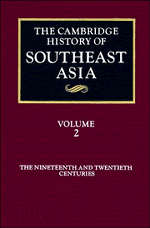Book contents
- Frontmatter
- PART ONE FROM c. 1800 TO THE 1930s
- 1 The Establishment of the Colonial Régimes
- 2 Political Structures in the Nineteenth and Early Twentieth Centuries
- 3 International Commerce, the State and Society: Economic and Social Change
- 4 Religion and Anti-Colonial Movements
- 5 Nationalism and Modernist Reform
- PART TWO FROM WORLD WAR II TO THE PRESENT
- Bibliographies
- References
5 - Nationalism and Modernist Reform
from PART ONE - FROM c. 1800 TO THE 1930s
Published online by Cambridge University Press: 28 March 2008
- Frontmatter
- PART ONE FROM c. 1800 TO THE 1930s
- 1 The Establishment of the Colonial Régimes
- 2 Political Structures in the Nineteenth and Early Twentieth Centuries
- 3 International Commerce, the State and Society: Economic and Social Change
- 4 Religion and Anti-Colonial Movements
- 5 Nationalism and Modernist Reform
- PART TWO FROM WORLD WAR II TO THE PRESENT
- Bibliographies
- References
Summary
Throughout Southeast Asia, the early twentieth century produced reformist activity directed toward altering established practices, whether indigenous or colonial in origin. This modernist impulse accepted the need for change, recognized benefits to be gained from some of the new arrangements introduced under colonial régimes or by Western advisers, and generally worked within the framework of bureaucratic systems of administration, creating organizations and promoting principles that owed little or nothing to indigenous traditions and much to ideologies and techniques introduced from outside the region. Many modernist reformers had Western educations and held ideas concerning how governments ought to be run that were similar to the views of the officials whose régimes they opposed. They often had somewhat less in common with the mass of the people, for the most part semi-literate peasants, in whose name they professed to act.
One strain of modernist activity led to the formation of governments for the states that succeeded colonial régimes after 1945, and part of the task of this chapter is to explain the role of modernist political movements in events leading up to the creation of these successor states. Such movements are conventionally called nationalist, but most of them represented nationalism of a particular sort, based on territories containing heterogeneous populations rather than on groups of people with shared cultural characteristics. A second strain of political activity represented the interests of collectivities with good nationalist credentials. The members of these groups thought of them selves as part of a larger whole sharing a common language, religion, or culture (‘imagined communities’ in the terminology of Benedict Anderson, but they did not form independent states and their unsatisfied nationalist aspirations would remain a source of political conflict in post-colonial Southeast Asia.
- Type
- Chapter
- Information
- The Cambridge History of Southeast Asia , pp. 249 - 324Publisher: Cambridge University PressPrint publication year: 1993
References
- 3
- Cited by



